#novel reviews
Photo

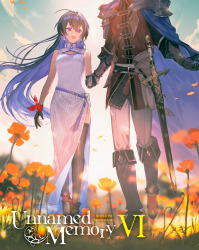
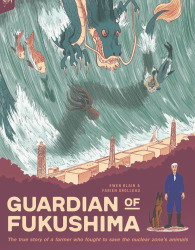
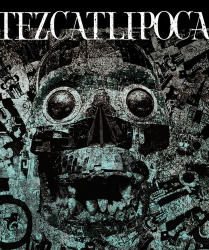
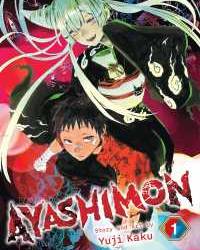


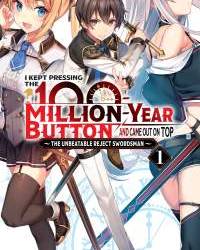
Fantasy, romance, and shonen feature prominently in our reviews this week, but so, too, do two rarer releases for manga-associated brands. They include Guardian of Fukushima, a Franco-Belgian work inspired by Japanese culture and the 2011 earthquake, and Tezcatlipoca, a Japanese novel combining Aztec mythology and modern organized crime. Read on to see what we thought of these departures from the usual, as well as more typical light novel and manga fare!
Ayashimon • The Girl I Like Forgot Her Glasses (Vol. 1) • Guardian of Fukushima • I Kept Pressing the 100-Million-Year Button and Came Out on Top • Sweet Poolside • Tezcatlipoca • Unnamed Memory (Vol. 6)
-----
Unnamed Memory, Light Novel Vol. 6
FYI: this is the final volume of the series, so some mild spoilers are unavoidable. The first volume of the story introduced magical mystery man Valt…and promptly killed him. Well, he’s back in a big way. This series has often had a mystery-of-the-week feel, but certain plot threads—Valt, time travel, witches, the anti-magic sword Akashia, a pair of mysterious orbs, etc.—have helped link the various narrative episodes about Oscar the king and Tinasha the witch, and many of them come together for this finale. I found it a little confusing, but some of that is probably because it’s been too long since I read the preceding volumes, and some of it is probably because time travel is supposed to be a bit puzzling. Be warned that this is a wild ride and you shouldn’t expect everything to be wrapped up in a tidy package. I found the ending is reasonably satisfying, but it’s definitely more “and the adventure continues” than “happily ever after,” and it left me with questions. The Afterword even hints at the possibility of a sequel series. The banter/bickering and mutual trust between Oscar and Tinasha remain charming and enjoyable, and (some) mysteries get resolved. If you’re looking for a fantasy-mystery-romcom, I definitely recommend the completed series that is Unnamed Memory. ~ Jesk
Unnamed Memory is published by Yen Press.
Guardian of Fukushima
This isn’t a manga; it isn’t even Japanese. Instead, it’s a Franco-Belgian bande desinée in the tradition of Asterix and Tintin, but one that tells a very Japanese story: of the earthquake of 2011, the devastation it wrought, and the one man who arose amid the chaos as the “guardian of Fukushima,” Naoto Matusumura. He is the one who returned to the restricted zone in order to care for the animals that had been abandoned during the evacuation—pets and farm animals alike (even ostriches!)—and who has remained there ever since, breaking the law on a daily basis and becoming the most irradiated man alive in the process. But Guardian of Fukushima is not just another retelling of an inspiring true story. Instead, Matsumura’s tale here is “liberated by fiction” (foreword), as writer Fabien Grolleau and artist Ewen Blain re-envision a 21st-century hero in the context of centuries-old Japanese folk tales, legends, and spirituality, in a manner reminiscent of Studio Ghibli’s eco-activist films and Kawatsura’s The House of the Lost on the Cape. The work draws on a rich tapestry of references: from yokai and guardian spirits to the giant catfish Numazu whose thrashing is responsible for earthquakes, to the tale of Urashima Taro, the fisherman and champion of sea life who returns home to find a world transformed—much like Matsumura himself, as the foreword points out. And it works really well, most of the time (the yokai sequence being the exception—it’s not very well integrated into the overarching narrative). Matsumura’s story is moving, but the volume wisely resists becoming overly sentimental and instead emphasizes the protagonist’s steadfast commitment to his conviction that the value of animal life is on par with that of humanity. The graphics are stunning, with the brilliant color work characteristic of bande desinée and a charming hand-drawn feel, right down to the quavering panel lines. The animals are full of personality, and much care has been taken to render the natural landscape with the vibrancy of spring, even amid the destruction. All in all, this volume is a treat for the eye and the heart as well, and a fitting tribute to a man who has laid down his life for creation. ~ claire
Guardian of Fukushima is published by TOKYOPOP.
Tezcatlipoca, Novel
A bold attempt to mix ancient myth with a modern crime tale, Tezcatlipoca is creative, heavy, and for long stretches an absolute page-turner. But it’s also ultimately underwhelming. The modern-day myth traces the lives of a number of characters caught up in a horrifying crime trade (I won’t spoil it here except to say that it’s very 21st century), but two men in particular: a neglected boy with extraordinary strength who is confined for an act of violence he committed as a juvenile, and a drug lord whose family has been assassinated by another drug cartel. The latter, Valmiro, is fueled by his grandmother’s stories about the Aztecs and their great warrior kinsman, as he bides his time in building a new empire with ancestral determination and through cruel, ritual killings; his is a story of revenge against those who killed his family. Tezcatlipoca is an epic tale, beginning decades earlier and an ocean away from Japan, where the main story eventually moves to. It reminds me of another novel involving cartels, Clear and Present Danger, in how absorbing the straight-forward explanation of events are in both novels and how deep the authors dive into character descriptions. Unlike that Tom Clancey book, however, Kiwamu Sato’s similarly lengthy tome spends a great deal of time in the abstract world of Aztec myth and religion, as Valmiro creates a “familia” that is centered on that fierce and brutal culture. In fact, Sato spends too much time on the Aztecs. As compelling as they are, the gangsters’ imitation of the ancient warriors becomes a bit repetitive in the tale, and there are too many gods and terms to follow along closely. While weaving the past with the present, the author seems to lose sight of the drug lord, who is the most interesting character in the novel; it’s a major oversight, particularly because the entire book hinges on weaving together his story with Koshimo’s, and it doesn’t happen with the same care as how their backstories are crafted. Instead, that and most of the elements in Japan are rushed, including a slam-bang climax and a final scene that is wonderfully poetic but would have made a deeper impact if given more time to develop. It’s a disappointment because if Sato had written the final act with as much patience as he did the earlier ones, Tezcatlipoca very well may have been a special novel rather than the mixed bag it ultimately is. ~ @animepopheart
Tezcatlipoca is published by Yen Press.
Ayashimon, Manga Vol. 1
One of newest entries into the “beat-’em-up” category of shonen manga, Ayashimon is bursting with energy while sticking to the tried and true of the genre. And it appears that the formula has produced a winner. Ayashimon‘s protagonist is Maruo, an impossibly strong young man who is dissatisfied with life since it’s nothing like the shonen manga he adores. His worldview totally shifts when he encounters Urara, the daughter of the deceased leader of the now-fractured Enma crime syndicate, who contracts with him to be her muscle in a quest to take power. The one-on-one battles, which take place within the concept of “ritual” duals, are cleanly drawn and dynamic. The characters are stylish and the world is creative, flipping Kabukicho into a den of demonic yakuza—the titular ayashimon who wear human faces to disguise their monstrous identities. It’s a violent series, featuring beheadings and amputations, but it doesn’t feel graphic, perhaps helped along by the ayashimon “dying” for only 99 years and their bodies transforming into cash upon “death” (I’ll let you make the symbolic connections there). Meanwhile, Urara and Maruo make for intriguing anti-heroes, criminals who are not-so-bad compared to the awfulness around them. Volume one ends on a cliffhanger involving what appears to be one of the series’ main antagonists, creating high stakes for a series that feels like it shouldn’t have any because of the immortality of the ayashimon and the OP qualities of Maruo. It just goes to show what a talented mangaka can do with an entertaining concept. What a great start! ~ @animepopheart
Ayashimon is published by VIZ Media and releases on March 7th.
The Girl I Like Forgot Her Glasses, Manga Vol. 1
I never expected Miss Miyazen Would Love to Get Closer to You to have a potential rival when it comes to shonen romcom cuteness, but The Girl I Like Forget Her Glasses is a worthy contender! Komura is excited about his new homeroom and the cute girl next to him…who happens to forget her glasses all too often! While he is happy for the (multiple) instances when he can talk and help his crush, he feels his heart might give out way too soon from how close she has to get to him so she can see his face! This was such a cute read! I was surprised by how fast I read it, but Komura is so, so, so adorable that it was hard not to look ahead to see what his expression would be on the next page! Ha! His reactions are always worth seeing, especially when Mie gets very close to his face. Mie was also pretty funny, and I loved how she would talk like a samurai sometimes because it honestly just added more to her cute charm. After reading this first volume, I’m so excited this will be getting an anime, as I think it’s going to be such a delight to watch onscreen! Definitely recommending this series if you like sweet and wholesome romances with some great art! ~ @lauraagrace
The Girl I Like Forgot Her Glasses is published by Square Enix.
Sweet Poolside, Manga
Shuzo Oshimi’s first weekly serial has finally been published in a bound volume. Nearly twenty years after it originally ran and followed by many other successes (The Flowers of Evil, Happiness), this one-volume work exhibits Ochimi’s talent but is deeply flawed, as the author admits himself in a cute side manga at the end of the work. Sweet Poolside is about the relationship between two swimmers, drawn particularly from Ota’s point of view as a boy whose body is less mature than some of his classmates. In fact, he has baby-smooth skin and no hair on his body other than atop his head, which is at the opposite end of the spectrum from the beautiful Goto, who feels enough of a kinship with the boy to ask him to help her improve her confidence by shaving her. Strange, yes, but you could see how such a storyline could develop into a warm and meaningful series, can’t you? And there are nice moments in this limited-run manga, mostly in the awkwardness that Oshimi puts on full display through Ota’s thoughts and actions, but there are not enough to make it as warm and sweet as I would have hoped from this coming-of-age story. Sweet Poolside also features erotic elements meant for the male gaze, as Goto is illustrated in sexually charged ways—while Ota, though arguably shown more graphically, is drawn as such only to add to the adolescent awkwardness of the story rather than to its eroticism. Sweet Poolside would have been better and sweeter if Goto was treated more fully like Ota. As it is, we’re left with a story that doesn’t quite come together and a female lead who’s nothing but her body—not a manga I would recommend. ~ @animepopheart
Sweet Poolside is published by Kodansha.
I Kept Pressing the 100-Million-Year Button and Came Out on Top, Light Novel Vol. 1
Volume one of I Kept Pressing the 100-Million-Year Button and Came Out on Top serves as a reminder that sometimes an adaptation exceeds—in this case far exceeds—the source material. I called volume one of the manga a “pleasant and unexpectedly fine read,” but the original light novel which it adapts is dreadful. The story is precisely the same—Allen, a bottom-tier, no-talent swordsman, punches a “100-million-year-button” that takes him to an alternate dimension where he trains for that amount of time (and then again and again), leading him into OP-hood before he begins to attend a special swordsman academy. Yes, the idea is silly, but the manga tackles it with optimistism and fun. The light novel has the same tone, but the writing is too atrocious for me to enjoy the cute characters and funny events. The narration is only slightly better than “And then I did this…and then I went here…and then this happened…” as the story moves from one scene to another without rhyme or reason. More visual media are able to hide these issues, but awful writing is more obvious in a light novel. Other substantial problems, like a lack of characterization and creativity in the world-building, also derive from the weak writing. I encourage you to skip this volume, but if you want a fun and upbeat fantasy/school story, check out the manga adaptation—it features all the good parts without being weighed down by the bad. ~ @animepopheart
I Kept Pressing the 100-Million-Year Button and Came Out on Top is published by Yen Press.
=====
“Reader’s Corner” is our way of embracing the wonderful world of manga, light novels, and visual novels, creative works intimately related to anime but with a magic all their own. Each week, our writers provide their thoughts on the works they’re reading—both those recently released as we keep you informed of newly published works, and those older titles that you might find as magical (or in some cases, reprehensible) as we do.
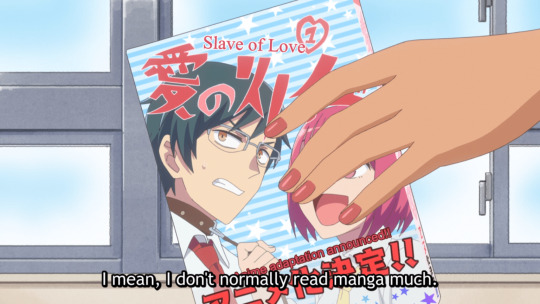
#Manga#Light Novels#Novels#Comics#Ayashimon#Unnamed Memory#Guardian of Fukushima#Sweet Poolside#I Kept Pressing the 100 Million Year Button and Came Out on Top#Tezcatlipoca#The Girl I Like Forgot Her Glasses#Suki na Ko ga Megane wo Wasureta#Ichiokunen Button wo Rendashita Ore wa Kidzuitara Saikyou ni Natteita: Rakudai Kenshi no Gakuin Musou#Reviews#Reader's Corner#Manga Articles#Manga Reviews#Light Novel Article#Novel Reviews#Light Novel Reviews#Articles#Comic Reviews#Author: Jeskai Angel#Author: claire#Author: TWWK#Author: Laura A. Grace
9 notes
·
View notes
Text
SNOW SHARK by Brian G. Berry
Not to be confused with the 2012 horror film produced by Richard Chizmar. There is no relation.
When I first saw this shared on Facebook, I knew I had to read it. This kind of crazy, B-movie, schlock idea is right up my alley. A shark raging through the snow? Um…yes. I had high expectations, and for the most part, I was not let down.
First off, I have to say the story may have a schlock idea,…

View On WordPress
#2022 books#Amazon#animal horror#book#book reviews#books#Brian G. Berry#horror#independently published#Indie authors#indie books#indie horror#Kindle#Kindle Unlimited#novel reviews#novels#paperback#reviews#self-published books#self-publishing#shark#shark attacks#Snow Shark
0 notes
Text
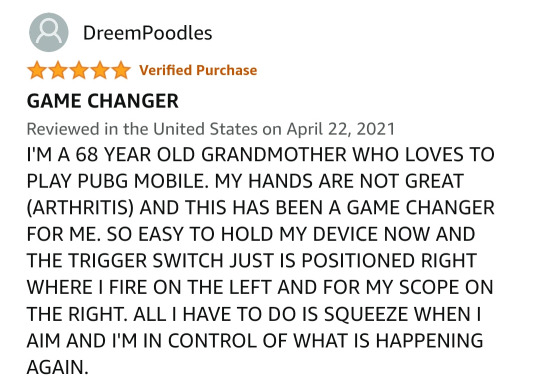
hell yeah gamer grandma
#their other reviews were for romance novels and poodle supplies so I don't think this is a troll review#listing was trigger switches for mobile phones btw
6K notes
·
View notes
Text
After I Flopped on My Crush by Pine Nut Tea or 暗恋翻车后 by 松子茶
Premise: Bai Xi has been in love with Qi Xun for six long years. Two years younger and accepting of his position as the older man's forever secret admirer, he is content to stay as friends as long as he could be beside the other man. A drunken one-night stand changes the trajectory of his quiet pining, as Qi Xun offers him a chance to be his lover with the end goal of marriage.
Despite knowing the lack of romantic feelings on Qi Xun's side, Bai Xi takes his chance, promising that he is content with this – Qi Xun as his doting boyfriend, and a chance to love the man.
Characters: Qi Xun as the top (also referred to as gong), Bai Xi as bottom (also referred to as shou). There's a plethora of interesting characters, of which I have some thoughts about too, but right now I'm focusing on these two.
Thoughts: Alright. I know I said I won’t be touching upon romance as much as other relationships. This is still true, I’m not a very romantic oriented person. Never been interested in it, although I do find it cute. And this? Phenomenal. Absolutely bonkers story. The plot is specifically just about Qi Xun falling in love and Bai Xi being doted upon as he deserves. It’s a gentle kind of story, there’s no angst. Both characters are green flags, and there are no miscommunication between the main couple. It’s sickeningly sweet, and all the characters are complex in their own way even if not always as explored as the couple. Which is fine!
And oh. Oh, the main couple. These two. Bai Xi and Qi Xun. The story focuses on Qi Xun in the eyes of Bai Xi, mostly, so I’ll save him for later. For now? Bai Xi. This man is such a good example of a static character. He knows what he wants – to be beside Qi Xun in whatever way he’s allowed – and he stands by it. There’s no growth, which is wild for a shou but fits very well with his character. He is firm in his position, and doesn’t hesitate to take his chances. He’d play coy sometimes, which is Adorable, but never for too long. It’s so clear that he’s waiting for Qi Xun and that even if Qi Xun never meets him halfway he’s… fine with that. He understands it and while it makes him sad it’s not enough for him to leave Qi Xun’s side.
He’s kind, and sweet, and adorable. His interactions with everyone are lovely and interesting. He loves Qi Xun. God, he loves Qi Xun so much you guys don’t understand. There are moments where he’d wonder if he could stand it, having only a little of Qi Xun’s affections, but he’d always come back from it. He’s jealous sometimes, but mature enough to accept that Qi Xun is a grown man and – more importantly – trustworthy. He loves Qi Xun and god. He’s so kind. Qi Xun refers to him as naive, but I don’t think he is. I just think that he’s strong, to choose kindness. It shines when he meets Qi Xun’s ex-boyfriend the second time.
The ex was injured that time, and instead of leaving the guy there after calling for help he takes him to the hospital, accompanies him to the doctor, and even feeds him. Qi Xun has a very funny reaction to this, which I’ll get into later. The point is that Bai Xi is a good person who is mature and easy to love. Even the ex worries about him after a few minutes of talking, to the point as they have a heart-to-heart about Qi Xun. The ex is… a good person. Not mean, although very mischievous. The x and Bai Xi have a similar start with Qi Xun, actually. They were in love first, and Qi Xun accepted.
But the ex, during his time with Qi Xun, wanted more from the guy. He wanted a lover, wanted Qi Xun to love him the way he loves Qi Xun. And Qi Xun… can’t give him that. Not that Qi Xun was a bad lover, in fact he was perfect, but there’s no love. He was affectionate, but there’s no affection – romantic ones anyway. Or so the ex thought. There was purposeful miscommunication between them, and the ex breaks up once he realizes that Qi Xun wouldn’t get jealous for him. He shares this with Bai Xi, and while Bai Xi understands he’s pissed LMAO. He goes you shouldn’t have done the [miscommunication] because it hurt Qi Xun.
Go Bai Xi!
Anyway, yes. He’s a good lad, and while it does feel unfair that he’s so… content, with whatever Qi Xun could give him, it’s admirable. He’s patient and just. So good.
And so, we move to him. The man of the hour. The guy himself, Qi Xun. The character growth is *chef’s kiss*. His character is this: a quiet man who is cold and stern. But he isn’t. He’s so, so soft. He’s silent in his kindness, and it's what Bai Xi loves about him. And me, I love him so, so much. He’s just – alright. Okay.
It’s never said specifically, but reading into it makes him sounds demi romantic. For those not in the know, that's the romantic orientation where you fall only for people you have a close bond with. He’s gay, that’s acknowledged (duh), but his experiences with romance sounds like this. Not canon, but just. An acknowledgement that it does make for a really, really good projection moment for me.
Now unto the text itself. Qi Xun, at first, didn't love Bai Xi. He holds affection, as they are friends, but the start of their relationship is him taking responsibility for Bai Xi’s feelings and their one-night stand. He was clear with it, and Bai Xi understood. And, when Bai Xi accepted, he did his best. He was a perfect boyfriend. I’m not gonna detail everything, because most of the plot is how he falls in love, but god does he fall hard. It was like I was falling for Bai Xi with him, even when our beloved shou is the main perspective.
And, the thing is, that he acknowledges how lucky he is about having Bai Xi’s love. He accepts he is hard to love – his father beat him to a hospital when he came out and his family are still trying to deal with that, and his ex-boyfriend, obviously. He doesn’t understand love, in general, both due to childhood reasons and just because he is Just Like That. So, he says, he is lucky to be loved so unconditionally. That Bai Xi chooses him despite how much he is lacking. He is a dedicated lover, a good partner. He is willing to eat Bai Xi’s cooking, which is. The less said about it the better.
He takes good care of Bai Xi, too. He is gentle in their everyday life, and took care of Bai Xi when he was sick. The entire relationship is taken in his pace, but this is only because Bai Xi loves him. He knows this, and every step he takes is with this in mind. The character growth, with him, isn’t noticeable. The entire story is a subtle thing, a slow burn despite starting when they get together.
I think, the first time I realized he’d fallen-fallen, was when they went on a date with a firework show. Bai Xi doesn’t seem to realize it, but Qi Xun - for the first time since the start of the book, was *jealous*. And shows it! He doesn’t make a fuss, but he glowers at the girl and pouts and it's absolutely ridiculous. It wasn’t one time thing either. Watching him start realizing he actually misses Bai Xi, realizing that he wants to marry him, to introduce him to his family as his – but still in denial of how he loves Bai Xi.
It takes him his ex offering to be Bai Xi’s rebound – to clarify, Bai Xi and his ex would be together, not Qi Xun and the ex – and his mother telling him he’d always treated Bai Xi as someone special for him to go. Ah, maybe this is love. Maybe this is it. They were already engaged, and there will be like a few days? Where Bai Xi have out of town work. And when shou comes back, it’d be his birthday.
And god, Qi Xun making this charm bracelet wishing for Bai Xi’s happiness and safety is so fucking CUTE. I was teary-eyed when I realized that god, he really does care for Bai Xi. And he knows it, then, that his heart belongs to this wonderful, fantastic man. But that isn’t his best gift, no. He takes Bai Xi to where they first met, where Bai Xi fell in love with him. He takes him to the exact bench, kneels, and says – to paraphrase – ‘this is my first time confessing, so I’m sorry if I do it wrong.”
And just. Ough. Words can’t explain what I feel about this. I was grinning so wide, and t makes everything worth it. The entire book is worth reading, just for that scene. Bai Xi, of course, bursts into tears. But he’s overjoyed, and there’s just. So much love. This novel is a love story and it delivers. Tooth-rotting sweet and barely any angst. The most intense part is the ex-boyfriend and it was wrapped up cleanly and easily.
Dog Food Rating: 200/10, the entire story from start to finish is nothing but dog food. Couples can read this for healthy communication class.
Story Rating: 5 stars. Definitely a good read. Focuses a lot on character interactions, which is what we want in love stories PERIOD.
Character ratings: A+. Character writing is phenomenal, never OOC, and main couple are green flags (my favourite).
1 note
·
View note
Text
My latest 5-star review on Amazon
For my novel, OVER THE RIVER, THROUGH THE WOODS.
Very Gripping and Exciting
Reviewed in the United States on August 18, 2023
Verified Purchase
The narrative becomes deeply poignant when Jenny's husband disappears while cycling, meeting an accident with a drunk driver and ending up in a river. Despite a broken leg, he vanishes from the hospital. Jenny courageously takes it upon herself to search for her missing husband, a journey that she undertakes alone.
Subsequently, Karsen enters her life, altering the trajectory of the story and leading it into unforeseen directions. The narrative becomes a blend of emotions, adventures, and romance, weaving a captivating tapestry.
#writing#writers#writers on tumblr#writing community#writerscommunity#writer things#writing tips#writerslife#novel writing#writers and readers#novelist#novel#romance novels#fiction#novel reviews
1 note
·
View note
Text
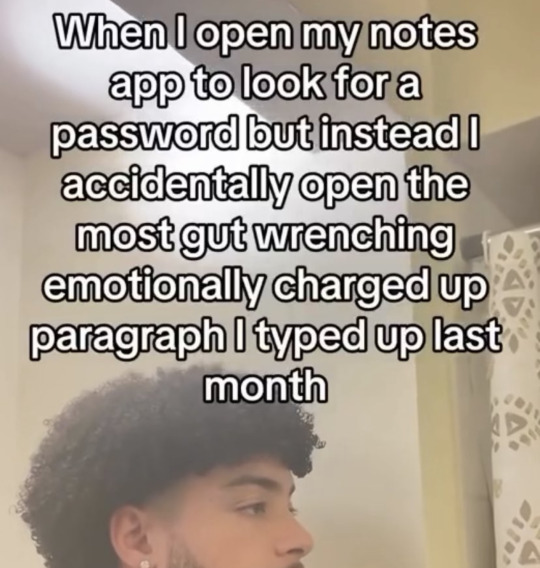
#me opening my notes app this morning bc i had written down things i wanna review today before my study session#and instead opening a whole fucking exercise about my ex from last year 💀#it’s literally a whole novel i’m so embarrassed#i
5K notes
·
View notes
Text
If you liked Camp Damascus, try Hell Followed With Us
and vice versa!
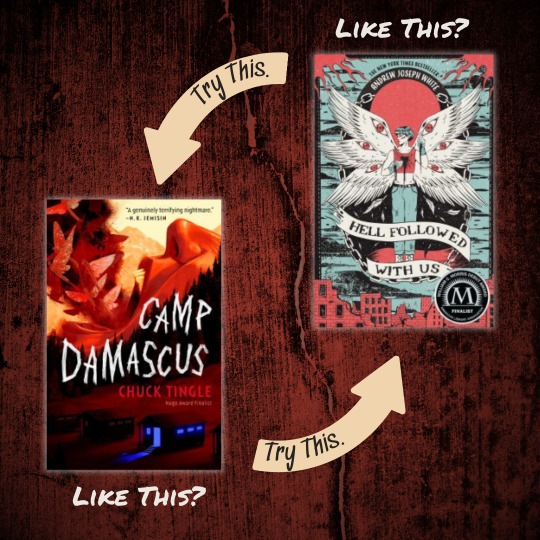
There's a lot to love in both Camp Damascus by @drchucktingle and Hell Followed With Us by Andrew Joseph White. As horror novels about queer youth with, shall we say, complicated relationships with religion, they have a lot in common - if you liked one you very well may like the other. Let's take a closer look.
Characters:
Both books feature queer, autistic youth fighting back. The characters are trying to survive in a world created for them by abusive adults and religious institutions that hold power over them.
In Camp Damascus we follow Rose (autistic, lesbian). In Hell Followed With Us we follow Benji (neurodivergent, trans) and Nick (autistic, gay).
Genre:
Both books are horror, but with two distinct flavors. Camp Damascus has more of a creepy factor, while Hell Followed With Us leans more toward gore. In Camp there is some mystery to the evil, but in Hell the evil has a name, a face, an address - and a to-do list.
Both books deal with Christian cults and the horrors of indoctrination. They deal with the characters' complicated relationships to Christianity as an institution and God as a concept. They also both quote Christian scripture heavily.
Vibes:
While both books are horror, they do feel very different, largely because the primary emotion that drives each story is different. In Camp Damascus, it's love. In Hell Followed With Us, it's rage. You'll certainly find both emotions in certain quantities in either novel, but what they primarily put forward distinctly changes the vibe of both books.
-
So there you have it! Two fantastic reads in close thematic conversation with each other - but still quite distinct. If either sounds good to you, do yourself a favor and check out both today!
See more of Robin's recs
#camp damascus#hell followed with us#andrew joseph white#chuck tingle#lgbtq books#lgbtq reads#lgbtq authors#lgbtq characters#horror#horror novel#queer horror#book review#book recommendations#books and reading#booklr#book recs#LCPL recs#robin's recs
316 notes
·
View notes
Text
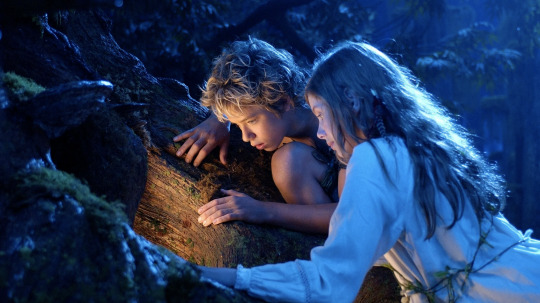
P.J.Hogan's 'Peter Pan' is still an underrated masterpiece 20 years later
Peter Pan is a live-action fantasy adventure film directed by P. J. Hogan that reimagines the classic story of Peter and Wendy. The screenplay was written by P. J. Hogan and Michael Goldenberg and was released in cinemas in December 2003. The screenplay is based on the 1904 play Peter Pan, or The Boy Who Wouldn’t Grow Upand the classic novel Peter Pan by J.M.Barrie, which was originally published under the title Peter and Wendy.
The film tells the story of a young Edwardian girl, Wendy Darling (Rachel Hurd-Wood) and her two younger brothers John and Michael. On the night she is told she must grow up, a wild, fairy-like boy called Peter Pan (Jeremy Sumpter) flies into her room with his high-maintenance fairy Tinkerbell. When he learns that she tells stories, he whisks Wendy and her two brothers away to a magical Island called Neverland — where you supposedly don’t “grow up” — so that she can mother his henchmen, the Lost Boys. There she fights pirates led by the evil Captain Hook (Jason Isaacs), meets mermaids, dances with fairies, falls in love and grows up.

I have strong family connections tied to Peter and Wendy and J.M.Barrie. My great, great uncle Nico was one of the sons of Sylvia Llewelyn Davies'. He and his other brothers "the Lost Boys" were adopted by J.M.Barrie; which ultimately inspired him to write Peter Pan. Nico’s daughter Laura — my cousin — who I met for the first time a few years ago, told me that she was flown to Australia for the filming of P.J. Hogan’s Peter Pan because she was J.M.Barrie’s goddaughter. She told me that she was thrilled with the cast, especially Jason Isaacs, who played Captain Hook and Mr Darling. She also mentioned that Jeremy Sumpter, who played Peter Pan, was a lovely boy. However, she said she was very surprised and sad that the film wasn’t a big success as she really liked what they did with the story. I have loved the fairytale of Peter Pan from a young age, and learning that I am literally part of the family that inspired the story was very exciting and I’ve only begun to internalise it more as I’ve grown older.
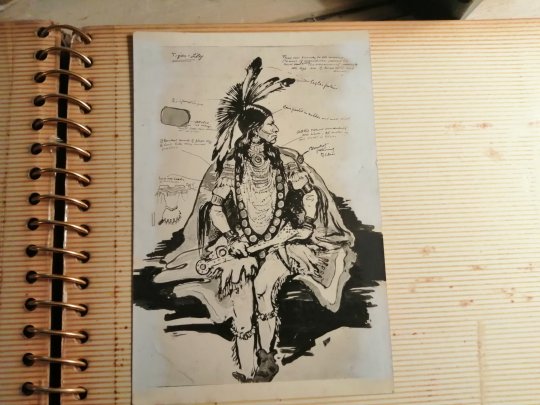
When I was in my mid-twenties, I was diagnosed with a high level of Autism. One of my main symptoms was labelled “ageless”, which in simple terms means that one half of me is still a child that I can’t mentally leave behind. I can’t do many things that most adults can do, such as pay bills, drive a car, look after my own well being etc. I flap my hands when I get excited. I bounce. I sometimes speak in a baby voice. I overcommit to things I enjoy. I admit that it was hard to come to terms with the diagnosis when I first received it. But over time, I’ve come to believe that the two can coexist in a healthy way. I believe that I am an adult who is able to develop and grow while still carrying the child within me, and that this is not seen as a bad thing. I think Peter and Wendy can be seen as a reflection of that.

I was first introduced to P.J. Hogan’s Peter Pan a few years after it was released (I was maybe nine or ten years old), and I absolutely loved it. It wasn’t only one of my favourite film adaptations, but one of my favourite movies of all time. What surprised me most about the film at that age was how dark and gruesome it was, and full of this underlying sexual tension that I hadn’t expected at all from Peter Pan. Even today, this film still has a special place in my heart. It is made with so much passion and love for the original text that I can automatically put myself back into the story. After watching the film again as an adult, I almost immediately opened my copy of Peter and Wendy and started reading. I would even go so far as to say that I prefer the film to the book. However, part of me wishes that the age rating had been set much higher, as the dark and gruesome moments were some of the strongest parts of the film adaptation. This is possibly why some critics and viewers had difficulty categorising the film at the time.
However, I often consider P.J.Hogan’s Peter Pan to be the same equivalent as Joe Wright’s Pride and Prejudice. (which came out a few years later in 2005, starring Keira Knightley and Matthew Macfadyen). The film moves at the same dreamlike pace. It is light, dark, colourful and deeply romantic.

I also often prefer P.J.Hogan’s Peter Pan to the 1953 Disney Animation of the same name, even though it’s the version I grew up with and liked. I find it much less straightforward and innocent. Also, the 2003 film is much closer to the original source material, which I loved reading as a teenager, and to J.M.Barrie’s original vision. The film manages to reflect the same intellectual subtext and depth of the novel while retaining the whimsy and magic.
Magical Realism

Peter Pan was a perfect blend of fantasy and realism. A lot of media these days focus too much on “realism” and make their sets and CGI look bland and washed out. It’s a common myth these days that no one likes whimsy anymore; it’s somehow seen as too childish. As a result, much of the magic of fantasy is lost. But in this Peter Pan, a lot of colour was used in the set design and cinematography. Everything was so brightly and colourfully lit. Most fantasy films these days, including the new live-action adaptation of Peter Pan and Wendy on Disney+, are all so gloomy and dark. You almost have to light up the screen to make out the actors’ facial expressions or what’s happening in the scene. But this film understands that a viewer who watches fantasy wants to be swept away, but also wants a certain amount of believability. Although the film contained a good amount of darkness, it did not shy away from being cartoonish either (which I think was partly inspired by the Disney animation), i.e. characters blushing or bouncing on the clouds.

The design of Neverland was breathtaking. I think the CGI, although criticised by some, made the island and creatures look more dreamy and fairytale-like. It was a good combination of CGI for the landscapes and real backdrops for the jungle, so there was enough magic and believability to transport the viewer into the story. A bright colour palette was used for the landscapes, while down-to-earth colours such as browns and greens were used on the ground, such as in “The Lost Boys Hide” under the tree, to give a sense of realism. The costume department also reflected this, from the majestic reds and blacks of the pirates, to the earthly colours of blue and red for the Native Americans, to the natural greens and browns of the Lost boys. I noticed that the colours in Neverland were used as a contrast to the Edwardian London back home, which is realistic but dull compared to the island.
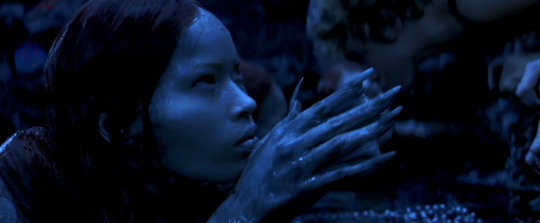
One aspect I liked was that the lighting on Neverland always changed depending on the mood of the scene- unlike the naturalistic lighting on Earth. It was almost as if the island was a living being. For example, when there was a fight on the ship, the lighting was red. When Peter took Wendy to the mermaids, who were scary and frightening, the lighting was dark and blue. This created a surrealistic atmosphere, almost like a fever dream or a kind of nightmare.
Sometimes the environment changed depending on Peter Pan’s mood in the respective scene. I particularly liked how Peter Pan influenced the weather on Neverland. Just his mere presence when he flew to the island changed the entire atmosphere in an instant. His feelings also determined whether it was summer or winter. In other words, its suggested in the film that the longer he has been there, the more the island has become a part of him, so that he can no longer leave it. It’s almost as if the island has transformed him into a magical being.

The exuberant musical score by James Newton Howard: I’ll never forget that. I think that was one of the first movies I saw where I actively noticed the music because it was so brilliant. Even today, the “Flying” soundtrack still gives me goosebumps. It perfectly encapsulates the whimsy, joy and imagination of Peter and Wendy. I loved that there were always different variations. One of my favourite pieces from the movie is ‘Fairy Dance’, which starts off cheerfully and moves up and down depending on the characters’ conflict/what they’re saying in the scene.
Cast
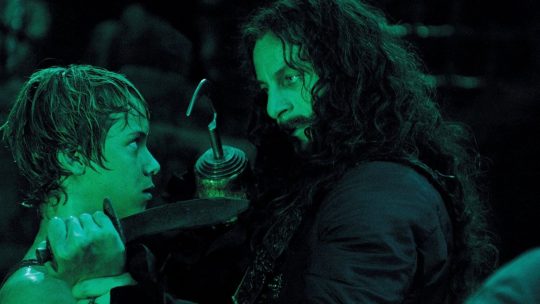
The cast of this film adaptation was magnificent. The look of all the actors not only matched the book description, but also the mood, especially with the Darling family. One of the standouts was Olivia Williams as Mrs Darling. She captured the gentleness of the character perfectly. I also loved the new addition of Aunt Millicent, played by Lynn Redgrave. She fitted into the story so well that I was surprised not to find her in the novel. She had the perfect amount of ridiculousness and hilarity that suited J.M.Barrie’s style.
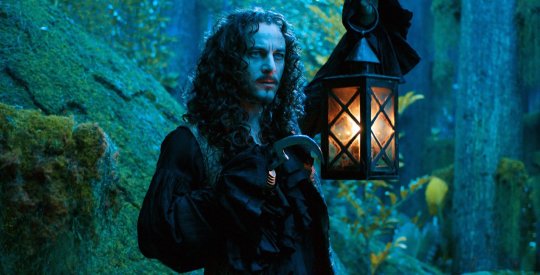
One particular member of the cast we can probably all agree on that was perfect, was Jason Isaacs, who played both Wendy’s father Mr Darling and Captain Hook. He was certainly a star in this film for sure. I just can not think of anyone who could play him better, especially in a live-action film adaptation. He was particularly good in the role of Captain Hook. When I first saw the film as a child, I did not know that Captain Hook and Mr Darling were played by the same person until my dad pointed it out to me because he was so good. I loved how they portrayed Wendy’s dad as shy and reserved, as opposed to Captain Hook who was flamboyant and sinister. Mirror versions of each other in different realities — that’s a common theme throughout the film. As Captain Hook, Jason Isaacs perfectly captured the essence of viciousness, deviousness and brutality that was necessary for the character. But also the deep loneliness and frustration behind it all. I have seen a quote that was supposedly cut from the film (and never should have been) that provides so much context for his hatred of Peter Pan:
“Imagine a lion in a cage and into that cage flies a butterfly. If the lion was free, it would pay no heed to such creature. But the lion is not free…and so the butterfly drives him slowly insane.” — Captain Hook
They did a really good job of showing how Peter Pan and Captain Hook are mirror images of each other. Peter Pan is a child who secretly wants to be an adult, while Captain Hook is an adult who secretly wants to be a child. Both fight each other for different reasons, but the goal is the same. For example, there is a great scene towards the end where Captain Hook uses his wits to defeat Peter in a fight. Here it becomes clear that there is deep symbolism for the inevitability of adulthood and the loss of childhood. Jason Isaacs really showed off his acting talent here. I liked that he wasn’t portrayed as a “dumb villain”, which he easily could have been.
There were also some great performances among the adults. Most notable was Richard Briers as the ‘pirate’’ Smee. But the child actors, especially the lost boys, really held the movie together. Their solid performances made it so believable that the island was ruled by children. I loved Theodore Chester as Slightly. He was very charming and funny in that role.

Another member of the cast I thought was brilliant was Carsen Grey, an indigenous actress of Haida descent, who played Princess Tiger Lily. I liked that they let her speak her ancestral language, Mohican, in this film. Although this film came out in the early 2000s, it is the only version of Peter and Wendy in which Native Americans are neither erased nor white-washed even though the representation is far from great. Considering how they’re treated in the novel, it’s perhaps for the best overall that they limited some of their scenes. However, I liked how firey she was in this adaptation and not the damsel in distress she was portrayed as in the Disney animation. I think it was a wise decision to cut the infatuation she had with Peter Pan, as it was really just one line in the book that would have added unnecessary drama, and all in all, it would have fallen short if all the female characters were jealous of each other.
They also downplayed Tinkerbell’s jealousy in this regard, portraying it more as her trying to protect Peter Pan’s youth from romantic advances, as hinted at in the novel, and also being sad that Wendy is attracting all of Peter Pan’s attention. Ludivine Sagnier has, in my opinion, succeeded well in making Tinkerbell equally repulsive and endearing, as befits the character.
Wendy Darling
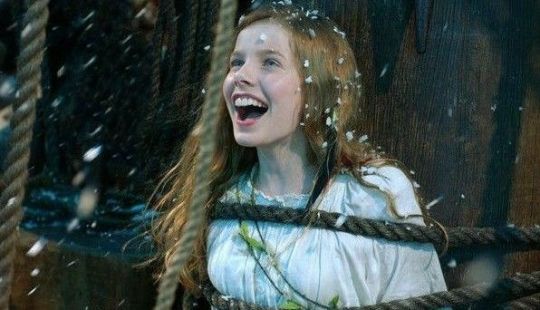
Rachel Hurd-Wood was the perfect cast for the role of Wendy Darling.I was actually surprised to learn that this was her first film role ever, because she was a natural. She effortlessly possessed the same caring nature and charm that makes Wendy so endearing. She is exactly how I imagine the character when I read the story. When people talk about Peter and Wendy, they always mention Tinkerbell, Pan or Hook, but personally I am always drawn to Wendy. She is the real heroine of the story. After all, she was the main reason for Peter to bring her and her brothers to Neverland.
What always amazes me about Wendy’s role in the story is the fact that Wendy literally doesn’t spend much time being a “child” in the time she spends in Neverland. When she’s not escaping death at the hands of mermaids or pirates, she acts as a mother to the ‘lost boys’ and her brothers. She asks herself what she really wants from life. In comparison, she was allowed to behave more like a child at home in Edwardian London. Neverland is not a place where you never grow up. It’s the place where she chooses to grow up. Many people have described Neverland as a manifestation of Wendy’s subconscious as a result of trauma, and I’ve never found that to be more true in this adaptation.
One of the reasons why I think P.J. Hogan’s Peter Pan is the best adaptation of the novel is the fact that the film revolves around Wendy’s coming of age. I loved that they expanded on her love of storytelling and also gave her a tomboyish streak. Instead of just being on the sidelines, she’s able to get involved and fight pirates while retaining many of her feminine traits such as her maternal instincts and romantic feelings for Peter. She makes mistakes and sometimes gets dragged into things she knows she shouldn’t do. But in the end, she triumphs.
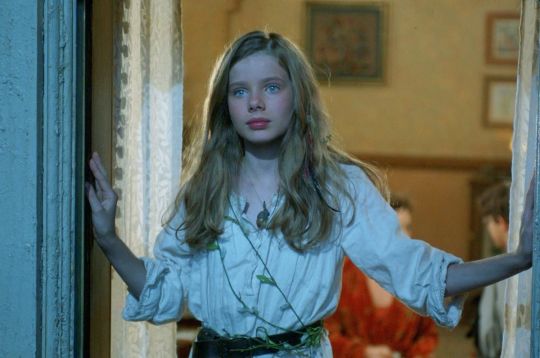
In many film adaptations of Peter and Wendy that I have seen, Wendy is either only present in passing or not at all. Characters like Peter Pan, Captain Hook and Tinkerbell always take centre stage, which I think is a strange decision as they are part of Wendy’s story and not the other way around. Peter Pan is meant to metaphorically represent the childhood she does not want to give up (which is why the character is always played by a woman in the original play, as he is a mirror image of Wendy). And Captain Hook (J.M.Barrie also wanted him to be played by the same actor as Mr Darling) represents the dark side of her father, or rather what she imagines adulthood to be. This is particularly emphasised in this film adaptation because he is an important factor in her being told to grow up. The father, the concept of adulthood, and Peter Pan, her childhood, are at constant war with each other.
“You’re not supposed to be like Peter, who kept every good and bad aspect of being a child and can’t tell right from wrong. You’re not supposed to be Hook, either. He let go of everything childish and loving about him and became bitter and evil..You’re supposed to fall in the middle, to hold onto the things about childhood that make it beautiful — the wonder, the imagination, the innocence — while still growing up and learning morality and responsibility. You’re not supposed to be Hook. You’re not supposed to be Peter Pan. You’re supposed to be Wendy Darling.” — @maybe-this-time
The 2023 film Peter Pan and Wendy took a different approach, by making Wendy a kind of powerhouse who always saved the day and outshone Peter Pan overall. In my opinion, the 2003 film adaptation emphasised very well that Wendy really is the yin and yang. She's allowed to be romantic, be rescued by others and at the same time determine her own destiny and stand up for herself. Because that’s what her journey in the adaptation is all about. She is pressured by all the adults in her life to grow up. She allows herself to be seduced with the prospect of an eternal childhood by Peter Pan. Then she realises that it is not self-fulfilling. She is tempted by Captain Hook with the concept of adulthood. And finally, she finds a balance between these two extremes on her own terms. By the end of the film, Wendy has made her peace with growing up while still remaining a child at heart. That requires a certain mental strength that we should all strive for.
Peter Pan and Wendy Darling
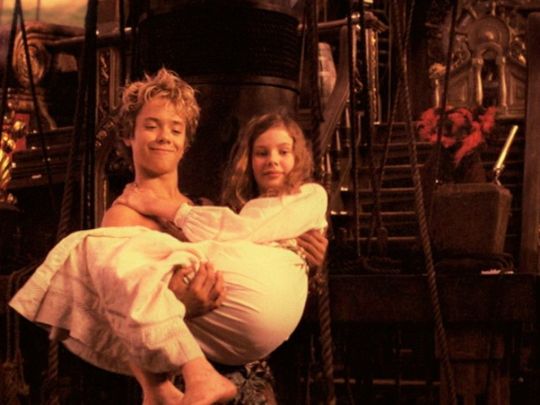
In most adaptations of Peter and Wendy, such as Hook and Syfy’s Neverland, the focus is on the title character Peter. In the more recent film adaptation Peter Pan and Wendy, the focus is on Wendy. This film adaptation of Peter and Wendy, on the other hand, sticks more closely to the original source material, as the story focuses on Peter and Wendy’s relationship. This is perhaps the reason why I always hesitate when I watch other adaptations, because these two characters are supposed to go together. It’s definitely a relationship that can be portrayed in all sorts of ways because they are symbolically the same person.
Although there is no romance between Peter and Wendy in either the original novel or the play, Wendy quickly develops romantic feelings for Peter which, as a prepubescent child, he does not consciously reciprocate as he has no concept of love other than that of a mother’s. Although Peter cares deeply for her, he ultimately only longs for her to be the maternal figure that is missing in his life. One could go into the symbolism that Peter and Wendy are one and the same, and that this is an expression of Wendy learning to love herself. But in a literal sense, J.M.Barrie had unintentionally created this very strong potential between the two characters. And I personally feel if your'e going to make an adaptation of Peter and Wendy that potential needs to be explored in some way, even if it’s not necessarily romantic.
Hogan recognised this potential and developed the romantic elements, e.g. ‘the “thimble” from the novel, into a very real and tangible plot. In other adaptations, Peter and Wendy’s relationship is rather one-sided. But in P.J. Hogan’s film adaptation, however, it is not at all. Over the course of the film, Peter and Wendy fall deeply in love with each other.
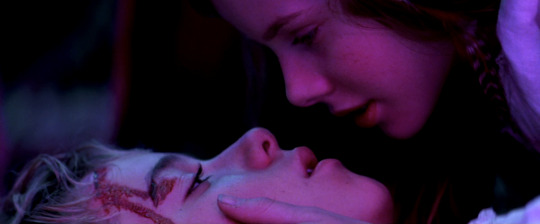
Rachel Hurd-Wood and Jeremy Sumpter had a remarkable on-screen chemistry for young actors, which helped give the adaptation its own identity. Whenever they interacted on screen as Peter and Wendy, it was — like the glittering pixie dust of Tinkerbell — simply magical. The off-screen chemistry between the two definitely helped make the romance so believable as well. When I was younger, I didn’t like romantic subplots in family films. I personally found that they clogged up the main plot because the “romance” tended to be very one-dimensional- but Peter and Wendy in the 2003 film version were simply enchanting.
In the original novel, J.M.Barrie alludes to the possibility of a romance between the two. In the film adaptation, they go all out. Their love story was written so beautifully and profoundly, while staying true to the original text and J.M.Barrie’s themes. This made the conflict hinted at in the novel of “staying in Neverland with Peter or growing up on Earth with Wendy” even more poignant and relevant, because in reality there was only ever one option. They couldn’t find a way to have both. That made the ending even more “heartbreaking” for me as a child, because even though they had the chance to be happy together, she couldn’t give up on growing up to stay. And he couldn’t give up being a child to leave, even though it was a natural progression for him.
Peter Pan
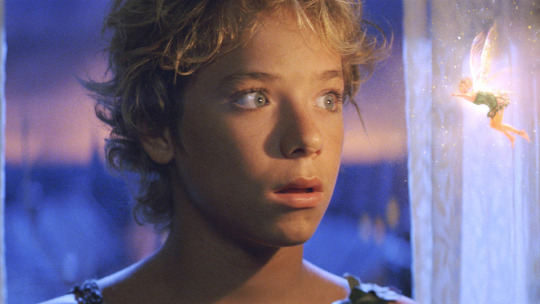
Jeremy Sumpter delivered a fantastic performance as Peter Pan. Not only did he perfectly match the illustrations, but he also managed to perfectly capture the essence of the charismatic, mischievous little boy from the novel. What’s more, of all the versions I have seen so far, he is by far the most accurate, right down to the clothes made of skeleton leaves, the dirty fingernails, the feral mannerisms, the traumatised soul behind the charm and the downright creepy insinuations. By today’s standards, you could almost take Peter Pan for a grown man who consciously decides not to behave like this.
However, when I watch the film again as an adult, I can now understand why he has reservations about growing up in Edwardian England and would rather remain a “child” in Neverland forever. As Peter says in the film, “Would they send me to school? And then to an office?” I feel like most of us today have so many choices as we get older, but back then it was much more limited. The choices were very restricted in that “heterosexist” environment. You could only be a certain thing, and it was much harder to hold on to the pleasures of life. I can now also understand the initial reactions of Michael and John to Peter: He must have seemed scandalous to people at the time. His bright colours, his inappropriate clothing and his behaviour are repulsive to the boys, but Wendy is immediately fascinated and attracted. I think it was a deliberate choice that he is the only character with an American accent to set him apart from the rest of the cast; to emphasise the wildness of the character and his non-conformity to the people of Edwardian London.
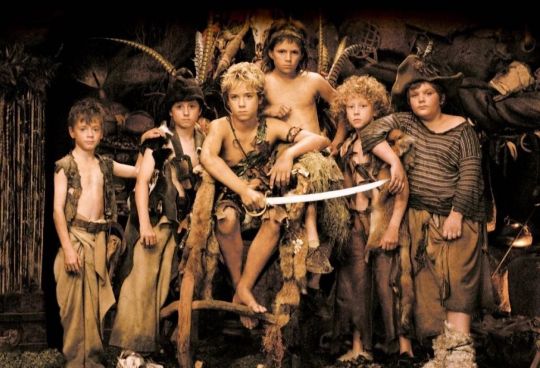
Another small aspect I liked was the suggestion that the Lost Boys, although they lived with Peter and obeyed his commands, lived in constant fear of him and did not worship him as in other adaptations. (A fear that is justified as Peter tries to kill them more than once in the film). What the 2003 film adaptation captured perfectly about Peter's character was: how terrible of a person he really is. Peter Pan is a hero when he goes on adventures and fights pirates. You could argue — via the quote “Leave Hook to me” (which Peter says to her in the film) — that Peter is Wendy’s split self who can fight her father (Captain Hook) for her, just like antibodies do with germs when we can’t handle them ourselves.
However, when it comes to understanding emotions, caring about others, even his henchmen, the Lost Boys, and doing anything that inconveniences him, Peter Pan is possibly as bad as Captain Hook. This makes Wendy’s decision to leave him all the more powerful. Although she was initially seduced by his adventurous life, she soon realises that his “life” of joy and adventure is not fulfilling at all. Because in reality, there is no real joy. There is no real adventure. In reality, his life is empty because it is not earned. In addition, she realises that she is gradually losing her memory of the outside world, including her parents - a sign that she is “slowly awakening from the dream”. This leads Wendy to realise that she wants more than what he can give her in Neverland (e.g. romantic love) and decides to leave. Being alive means feeling, accepting and growing. However, as long as Peter remains a boy, he can never truly be alive. Peter Pan conveyed this important message, whereas earlier film adaptations, including the Disney animation, did not.
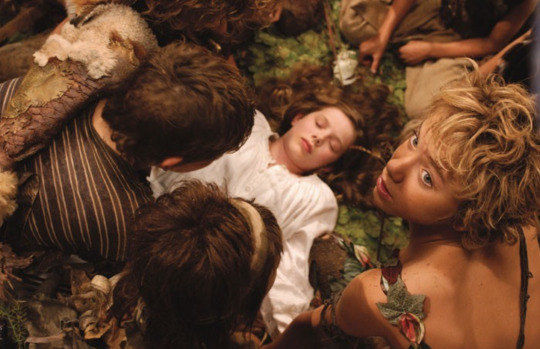
One of the reasons why good adaptations of Peter and Wendy are so hard to come by, especially in this day and age, is not only because they adapt a performative story that exists in layers of subtext. They also work with a protagonist who doesn’t change. Who doesn’t develop in any way, neither negatively nor positively. Not even just physically, but also mentally. (Even Eli from Let the Right One In, the child vampire, changes in the course of the story). At the end of day, Peter Pan is ultimately there to serve someone else’s story. It works in a fairy tale format. But it doesn’t usually translate very well to the screen because it often leads to one-dimensional storytelling. Even if it seems so natural, it doesn’t come naturally.
However, this adaptation allows Peter Pan to grow. The writers expanded on the small aspect from the book, which is the moment when Wendy enters Peter’s life; he begins to feel emotions. Not just love. But anger. Fear. Sadness. Pain. Disgust. And above all: self-awareness. Almost like a version of puberty in condensed time, as if the change suddenly caught up with his body. When Wendy brings this up, Peter immediately rejects it out of fear. I think most of us can all relate to this when we were in the midst of growing into a young adult. We experience feelings that are scary and new, that we can’t yet fully understand or even want to. For Peter Pan, falling in love is exactly what he is afraid of: growing up and no longer being a child. This adds to an interesting conflict that arises between the two when she asks him to leave with her.
“The thing about Peter Pan is, he’s a coward. Had the chance of a lifetime and he bottled it. Just fucked off back to Neverland. All alone, forever he was, by his own hand. Poor old Wendy, she had to grow old without him.” — Skins, 6x07 “Alo”
In the original novel, the reason Wendy can’t take Peter Pan with her (apart from the fact that he refuses to grow up) is the same reason Lyra in His Dark Materials can’t take Pan — the animal manifestation of her soul — on the boat to the land of the dead. She has to split in order to grow up and leave a part of herself behind. She can’t keep both in order to move on. But that does not mean I always agree with the ending either. In which Peter remains a child and takes Wendy’s future descendants to Neverland and back to look after him. It leaves an icky aftertaste, but at least it fits in with the story J.M. Barrie wanted to tell.

Even though the adaptation conveys the same message, that Peter Pan is the manifestation of Wendy’s youth, even to the end. In this version of Peter Pan, that is no longer the case. By the end of the film, the way he holds himself is different. The way he looks wistfully through the open window and solemnly says, “To live would be an awfully big adventure,” : a sign of self-awareness, while Wendy happily reunites with her family. So much so that Tinkerbell has to pull him by the hair to stop him from joining them and reconsidering his decision. Peter is now old enough to know that he loves Wendy. Maybe he’s also mature enough to know what he’s missing, but he knows he can’t have her the way he wants, so he does the most selfless thing he’s ever done in the whole film by letting her go.
There is no such conflict at the end of the 1953 Disney animated film. Peter Pan is described by Wendy as “wonderful”. In reality, everyone else gets their happy ending, except him, because he deliberately chooses not to. Peter Pan very much turns himself into a tragic figure because he is afraid of the most natural thing in the world. He is afraid of life. And I feel like this version of the story knew that and expressed it strongly, which makes me conflicted now as an adult. I’ve seen endings like this before, where two people fall in love but do not end up together because they grow apart or they are both interested in different things, and it’s very important to reach those points in different ways. It very much reflects real life and is also reminiscent of first love. How that love never really fades. It reminds you of simple times, even when you’ve grown up and moved on. That a part of you is still at that age when you look back on it. These endings happen because people grow — which Peter Pan does not.
“Peter in the books lives in oblivious tragedy. He may suspect that he’s not fully happy, but he tends to forget about it… yet this Peter doesn’t… Wendy leaving him and growing up to be a wife of another man is his unhappy thought…It’s the loss of innocence since Peter could not forget this…It’s the process of growing up…all but confirms that Peter’s character arc in the film is one of accepting the fact he too must grow up to be happy.” — @rex-shadao
And I think that’s the real reason why his character is both the strongest and the weakest part of the adaptation. The writers didn’t make it clear enough that Peter Pan forgets in their version of the character. In the novel, Peter Pan forgets everything automatically, which is why he can exist in this limbo of childhood and not go mad. However, as mentioned earlier, this version of Peter Pan is old enough to remember and, more importantly, to feel. Even though he is the closest to J.M. Barrie’s original vision, unlike his counterpart in the book, he is capable of evolving. That’s why the ending sometimes feels strange to me as an adult.
It was hard to say why I had a strange feeling at first, but I realised that a lot of my mixed feelings stemmed from having seen the film adaptation fresh after reading the novel. Since Peter Pan fully reciprocates Wendy’s love in this version, he ends up being a different character than in the book, which is why I now disagree with them keeping the original ending instead of having him grow up with Wendy. It would symbolise that childhood can co-exist with adulthood, that you don’t have to leave a part of yourself behind. That you can be your true and complete self if you find the balance between the two extremes.
The original ending still works however, in all its bittersweetness. I know what it means and understand what it stands for. Wendy basically says goodbye to her childhood and promises never to forget it. There’s a reason it made such an impression on me when I was younger. It could just be because I’m trying to pick up all the pieces of my broken heart from the floor. But personally, as an adult, I just find it weaker compared to the novel. Sometimes I like to imagine an ending to this version of the story where Peter Pan comes back, having quickly realised that he has outgrown Neverland, but doesn’t meet Wendy again until they are both much older, at a time when Wendy is coming to terms with womanhood and the idea of marriage. Or she even meets his real earth counterpart (if we were to delve into the psychology of Neverland being Wendy’s dream). And their relationship is subjected to the natural test of time and growth.
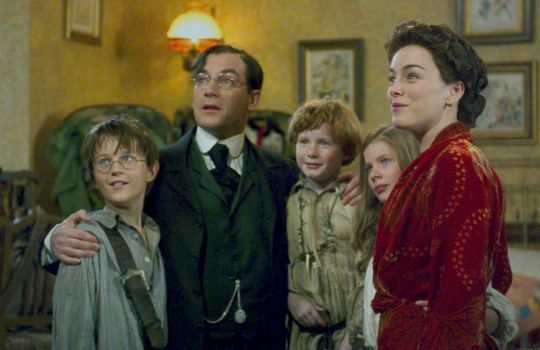
Peter Pan is an almost perfect adaptation. It matches the humour, the tone and the vision of J.M.Barrie. But I can certainly understand why the film didn’t do so well at the box office. In the month it was released, there was an unfair amount of competition, namely the film Lord of the Rings — The Return of the King. And as an adult, I can now understand why it’s not the film people think of or remember when it comes to Peter Pan adaptations. And it’s not just because it doesn’t fit the elfish, jolly trickster persona that Disney has created.
The film adaptation suffers more from what it doesn’t do — such as maintaining a stable tone and consistent editing — than from what it does. It’s one of those films that would have benefited from being much longer. That way, the inconsistent tone and some of the rushed parts of the adaptation would be much more balanced. It feels like it was missing an extra twenty minutes. For example, the film is narrated by an older version of Wendy, but without the deleted ending where it becomes properly clear that it’s her telling the story to tie everything together, the ending feels a little abrupt. Say what you will about Tim Burton’s adaptation of the Series of Unfortunate Events, but the audience could see where the film’s narration was coming from the whole time. I think if they knew the alternate ending wasn’t going to work (that scene is a classic example of something working well in the novel but not in the film), they should have removed the narrator altogether with the deleted ending and adjusted the film accordingly. They should have extended some scenes so that parts of the film weren’t rushed, such as the introduction, and the story would have been left more up to interpretation as there was no voiceover throughout.
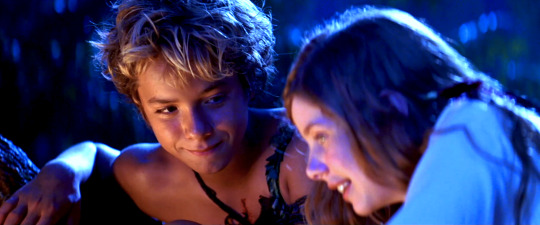
Despite its weaknesses, P.J.Hogan’s Peter Pan is still an underrated masterpiece 20 years later. It is an irresistible film that captivates and warms the heart. The film adaptation has certainly stood the test of time, staying true to the original while adding its own flavour to the story. It is full of magic, wonder and heart. It was clearly made by people who loved the origins of the story and explored where they came from, while also digging deep into the text to reshape the character arcs in a fresh and meaningful way. They succeed in capturing J.M.Barrie’s original message, which is that growing up is a natural progression of life, but that doesn’t mean leaving childhood behind entirely. That it is important to maintain a healthy balance between the two: Taking responsibility while appreciating the joys of life. From the vibrant colour palette to the goosebump-inducing music to the solid performances and gorgeous chemistry between Jeremy Sumpter and Rachel Hurd-Wood, my love for this adaptation will never end, no matter how old I am.
#peter pan#peter pan 2003#jason isaacs#jeremy sumpter#rachel hurd wood#peter and wendy#j.m barrie#peter x wendy#wendy darling#analysis#tinkerbell#captain hook#disney#peter pan and wendy#disney +#hook#James Newton Howard#olivia williams#novel#classic literature#filmmaking#film#cinema#culture#movie review#darling pan#finding neverland#film review#peter pan (2003)#peter pan live action
205 notes
·
View notes
Text
36 chapters into moby dick. some thoughts:
- take a shot every time he expresses his love for nantucket or whaling trivia
- i know everyone said it was queer and usually i've come to expect that as hyperbole but this time they weren't joking
- CHILDE HAROLD REFERENCE?!?!?!?!?! BYRON QUOTED?!?!?!?! not surprised bc it is the romantic genre which byron & chp helped inspire & he was the best selling writer in early 19c usa & is noted for his oceanic refs & he & esp childe harolds pilgrimage esp are both noted on wikipedia's "nautical fiction" page but like. i had no idea they were immortalized in moby dick
- "Better sleep with a sober cannibal than a drunken Christian." AAAAAAAHHHHHHHH
- does gay cannibal tumblr know about queequeg & ishmael?
- utterly obsessed with captain ahab for numerous reasons but does anyone else notice how similar he is to captain flint from black sails? like he's literally him but a bit older & combined with silver's leglessness.
- the part where ahab calls stubb a dog lmao
- ishmael getting worried for queequeg when he couldn't find him omg...
- "Where's that girl ? — there, Betty, go to Snarles the Painter, and tell him to paint me a sign, with — 'no suicides permitted here, and no smoking in the parlor;' — might as well kill both birds at once." MRS. HUSSEY!!!!
- i'm sure that all the focus on queequegs spirituality & his consultation with his god yojo wherein he was informed that ishmael had to pick their boat bc yojo demaded it TOTALLY won't prove to have any prophetic and symbolic consequences later on or anything
- love how the chapters are nice and short but on the flip side that means theyre tricking me into thinking i have less to go than i actually do... as long as i get more ahab i'm good i guess
-melville, at random: and now we take a break from our regularly schedule programming to give you . . . WHALE FACTS! [whips out multiple books on the history of whales and whaling, begins to recite]
#moby dick#currently reading#book reviews#book thoughts#book opinions#literature#american literature#classic literature#herman melville#childe harold’s pilgrimage#captain flint#captain ahab#ishmael#queequeg#lit#classic lit#novels#books
132 notes
·
View notes
Text
Everytime an anime-only makes a comment about Solo Leveling being cliche or only male power fantasy, it terrifies me more and more.
Because first off...
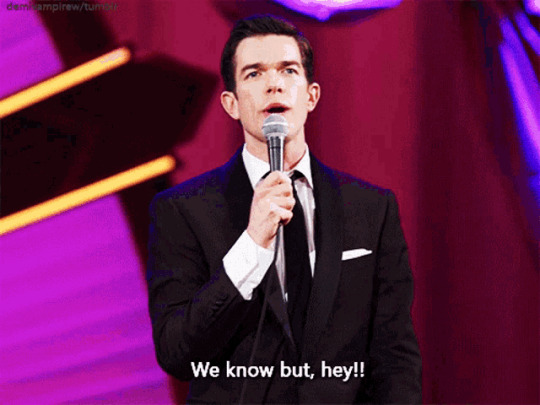
But mostly....it scares me for the rumored ORV anime.
Because ORV starts off in disguise. It makes you think it's another run-of-the-mill male power fantasy (a good one, but in the genre nonetheless), and then it slowly peels back the curtain. ORV does have an overpowered male protagonist, but ain't no one want to be Kim Dokja. Not even Kim Dokja.
But it takes its time. Even the webtoon ain't at That Scene (Chap 188) yet. Let alone the full nature of The Fourth Wall and the existential meta exploration of reader, writer, and protagonist. It drip feeds all that.
Just read the reviews on Novel Updates. Read any review of a reader who never made it past chapter 100. (irl Renouncers if you will.) Abundant complaints about how it's cliche and Kim Dokja is too overpowered. It's uninteresting and doesn't do anything other action apocalypse fantasies don't. Blah blah blah etc etc. Compare those to any reviews marked "complete." Night and day.
Now imagine that on a much much larger scale. There are people watching SL rn that have never touched a manhwa or webnovel in their life. And you know as soon as an ORV anime comes out, people gonna be reviewing it based on those first couple episodes. They're gonna say so much stuff about how ORV is copying others in its genre and the main character is overpowered for no reason and a bunch of other things ORV does On Purpose so it can subvert them later. ORV is also a love letter to its genre, so first it has to be solidly IN the genre. So they're gonna criticize the genre instead of ORV itself.
The internet is going to be flooded with people who do not and probably will never know what ORV truly is. How plot threads that seem like they are dropped will come back when you least expect it. How you will finish the epilogue and question your entire existence as a person who reads. How Kim Dokja is both someone the reader can and doesn't want to project themselves onto. He's the Rule of Cool but also inherently tragic.
There are gonna be so many ignorant comments and it's going to be so hard not to THROW HANDS.
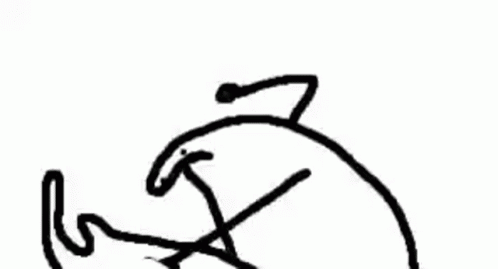
#not to mention#having to prevent spoilers#orv#solo leveling#omniscient reader's viewpoint#but seriously read those novel updates reviews#they kinda hilarious
110 notes
·
View notes
Text
Play Royal Affairs - Out Now!
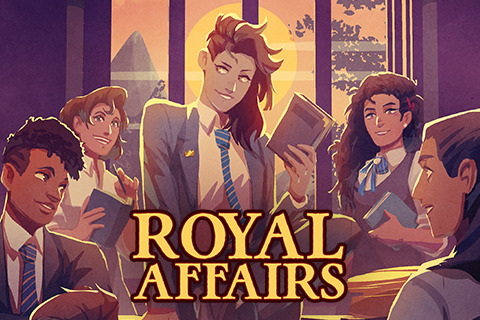
Steam | Apple Store | Google Play Store | Browser | Amazon
As the middle child of the Queen of Westerlin, you’ve led a sheltered life in the palace, but now you must spread your wings and prepare for your royal responsibilities with a year at the exclusive Archambault Academy.
Everyone knows your name, everyone has an opinion on what you do, and everyone views you as the face of the new generation of royalty. Your every move is reported in the press, a word from you could make or break a teacher’s career–or the fate of the school itself. You’re being courted by every club and social group on campus; and there are countless students who would love to be in your orbit.
In luxurious armchairs behind ivy-covered walls, you and your fellow students debate political theory—but outside, real trouble simmers across the realm. There are activists fighting to open voting rights beyond the aristocracy, and you can use your influence to sway the government’s decision in either direction. Relations are growing increasingly uneasy with your country’s neighbors, and there are conspiracies around every corner. Why is your mother whispering behind closed doors with the Prime Minister? Have the leaders of the protests really disappeared? Which allies can you trust? There are some secrets that only your royal authority can uncover.
Will you honor centuries of royal tradition and follow the path that your mother the Queen has laid out for you? Or will you be a force of change, leading your country in a new direction as you break free of a lifetime of expectations?
Oh, and speaking of expectations—there’s also the foreign royal that your mother wants you to marry. Who is in your class. And who happens to hate you.
Play as male, female, or non-binary; gay, straight, or bisexual; monogamous or polyamorous; asexual and/or aromantic.
Find love and/or friendship with your free-spirited childhood companion, a firebrand radical, a dreamy dancer, a financier haunted by tragedy, your devoted bodyguard, or a rival foreign royal.
Cuddle and train your pet: a horse, dog, or bird of prey.
Put on a lavish play, become a sports star, or run Student Council; and represent Archambault Academy against its rival Gallatin.
Become your classmates’ confidante and help them solve their problems—or make those problems worse.
Embrace your royal responsibility and carry on your mother’s tradition—and perhaps even take your sister’s place as heir to the throne.
Forge a path to the future by supporting revolutionaries’ calls for change, or stamp out the movement with scheming and deceit.
When this tumultuous year ends, will you be Archambault Academy’s crowning glory?
Steam | Apple Store | Google Play Store | Browser | Amazon
#choice of games#royal affairs#creme de la creme series#interactive fiction#indie games#amare games#text games#romance games#interactive novel#please rate and review if you enjoy!#this has been a huge journey and I'm so pleased it's out in the world
626 notes
·
View notes
Text
Long Exposure by Marsoid
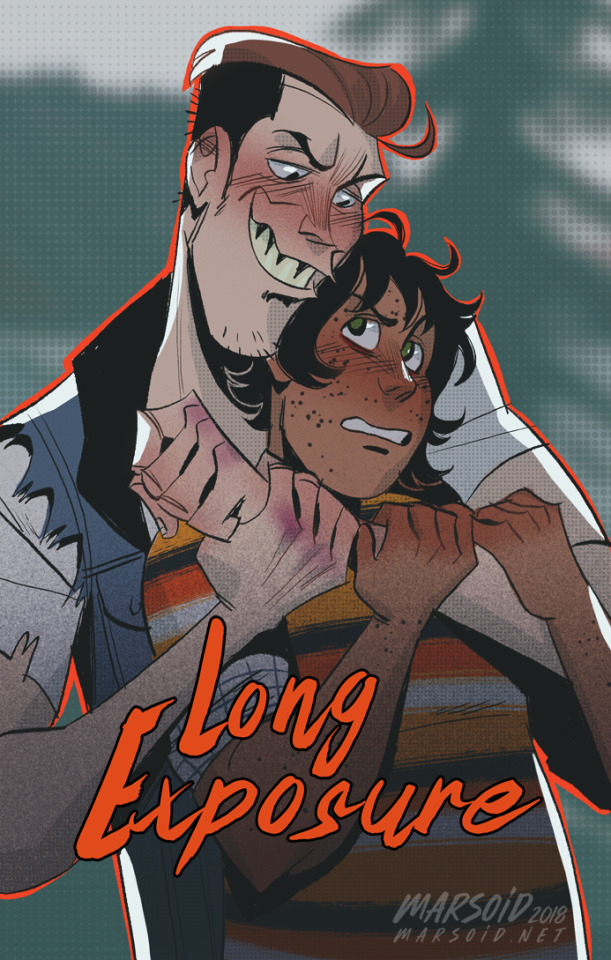
Alright. As always we're starting with trigger warnings. Child abuse, child pornography (referenced), underage drinking and drug use, homophobia, bullying, and some violence.
When Jonas' childhood bully comes back to his school after (rumor has it) he'd gone to jail for stabbing his stepfather, they're forced to work together on a group project. They stumble across a strange research facility in the middle of the woods and gain superpowers, but with that comes an organization following them. (And maybe some romance too?)
I love this comic so much. I've read it all the way through like three times. Jonas and Mitch have a really adorable relationship (though I guess not really in the beginning, although it is kinda cute with how Mitch is very lovey-dovey) and Mitch's shirts are pretty great. The art is amazing and I loved how it's in all black and white except for Jonas' powers. Would for sure recommend to so many people it's amazing and I love it.
Since this is a webcomic, the link from the cover photo will take you to the Tapas page, but you can also read it on Webtoons and at https://www.longexposurecomic.com. You can also buy it as a print book on the author's shop if you prefer, but I don't think the entire comic is available that way. You can find the author's tumblr page @marsoid.
172 notes
·
View notes
Text
Rebecca Roque’s “Till Human Voices Wake Us”
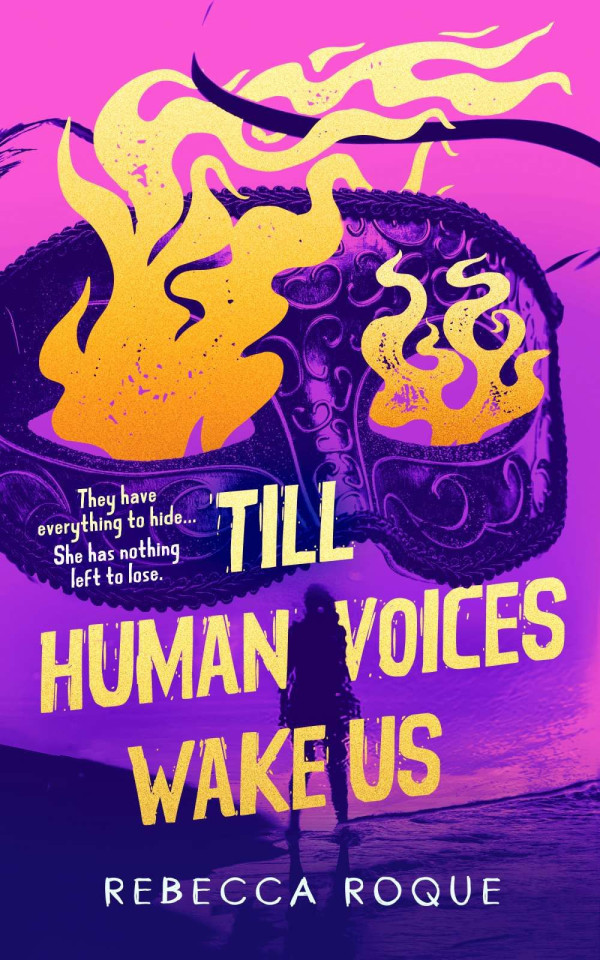
I'm touring my new, nationally bestselling novel The Bezzle! Catch me in TOMORROW (Apr 17) in CHICAGO, then Torino (Apr 21) Marin County (Apr 27), Winnipeg (May 2), Calgary (May 3), Vancouver (May 4), and beyond!

"Till Human Voices Wake Us" is Rebecca Roque's debut novel: it's a superb teen thriller, intricately plotted and brilliantly executed, packed with imaginative technological turns that amp up the tension and suspense:
https://www.blackstonepublishing.com/till-human-voices-wake-us-gn3a.html#541=2790108
Modern technology presents a serious problem for a thriller writer. Once characters can call or text one another, a whole portfolio of suspense-building gimmicks – like the high-speed race across town – just stop working. For years, thriller writers contrived implausible – but narratively convenient – ways to go on using these tropes. Think of the shopworn "damn, my phone is out of battery/range just when I need it the most":
https://www.youtube.com/watch?v=XIZVcRccCx0
When that fails, often writers just lean into the "idiot plot" – a plot that only works because the characters are acting like idiots:
https://en.wikipedia.org/wiki/Idiot_plot
But even as technology was sawing a hole in the suspense writer's bag of tricks, shrewd suspense writers were cooking up a whole new menu of clever ways to build suspense in ways that turn on the limitations and capabilities of technology. One pioneer of this was Iain M Banks (RIP), whose 2003 novel Dead Air was jammed with wildly ingenious ways to use cellphones to raise the stakes and heighten the tension:
https://web.archive.org/web/20030302073539/http://www.wired.com/wired/archive/11.03/play.html?pg=8
This is "techno-realism" at its best. It's my favorite mode of storytelling, the thing I lean into with my Little Brother and Martin Hench books – stories that treat the things that technology can and can't do as features, not bugs. Rather than having the hacker "crack the mainframe's cryptography in 20 minutes when everyone swears it can't be done in less than 25," the techno-realist introduces something gnarlier, like a supply-chain attack that inserts a back-door, or a hardware keylogger, or a Remote Access Trojan.
Back to Roque's debut novel: it's a teen murder mystery told in the most technorealist way. Cia's best friend Alice has been trying to find her missing boyfriend for months, and in her investigation, she's discovered their small town's dark secret – a string of disappearances, deaths and fires that are the hidden backdrop to the town's out-of-control addiction problem.
Alice has something to tell Cia, something about the fire that orphaned her and cost her one leg when she was only five years old, but Cia refuses to hear it. Instead, they have a blazing fight, and part ways. It's the last time Cia and Alice ever see each other: that night, Alice kills herself.
Or does she? Cia is convinced that Alice has been murdered, and that her murder is connected to the drug- and death-epidemic that's ravaging their town. As Cia and her friends seek to discover the town's secret – and the identity of Alice's killer – we're dragged into an intense, gripping murder mystery/conspiracy story that is full of surprises and reversals, each more fiendishly clever than the last.
But as good as the storytelling, the characterization and the mystery are, Roque's clever technological gambits are even better. This book is a master-class in how a murder mystery can work in the age of social media and ubiquitous mobile devices. It's the first volume in a trilogy and it ends on a hell of a cliff-hanger, too.

If you'd like an essay-formatted version of this post to read or share, here's a link to it on pluralistic.net, my surveillance-free, ad-free, tracker-free blog:
https://pluralistic.net/2024/04/16/dead-air/#technorealism
77 notes
·
View notes
Text
Introduction Post
Hello, everyone! I'm Sirius, your love 'expert'. I'm a college student with too much time in my hands. I will be sharing opinions about different relationships I find while I read - I'll try to be unbiased while ranking them, but this IS my personal opinion so... That may not be possible. The focus *is* the character arcs, interactions and their ties to each other, but I will briefly touch upon plot and even story themes if I find them interesting enough.
Despite the title of this page, it's in fact not very romance specific though some of it will end up to be. Expect more queer studies than straight ones when it comes to romance, and more platonic relationship than romantic ones. I hope you enjoy reading my thoughts, and you'll find a story that you'll be interested in to try!
Good luck, and happy reading!
0 notes
Text



march '24 favs:
• those who leave and those who stay & the story of the lost child ; elena ferrante — the final two books in the neapolitan novels, a tetrology recording the lives of two girls in naples from childhood to old age. gutting, beautiful, layered, and complex. this series is a masterpiece, elena ferrante is everything to me <3 (please read it!!)
• sirens and muses by antonia angress — following an array of characters at an art university as they navigate life, work, academia, relationships, and being an artist in a capitalist world where everything is commodified. the depth of characters paired with the nuanced discussions of art, class, and politics left me so pleasantly surprised. (it's also extremely gay and perfect for all you tumblr users with mummy/daddy issues)
#bringing back the monthly wrap ups as i havent had time for substack posts so far this year#4 stars#4.5 stars#book review#book recs#recs#monthly wrap up#wrap up#literature aesthetics#books#bookish#bookblr#bookworm#bookstagram#dark academia#booklover#elena ferrante#the neapolitan novels#those who leave and those who stay#the story of the lost child#studyblr#study#study tips#cafe#aesthetic#study space#studying#sirens and muses#antonia angress#sapphic
112 notes
·
View notes
Text
Gotta say, of all the protagonists in mxtx books, shen yuan is the most relatable. Why? I too would read an absolutely god awful trash terrible webnovel for the sole person of bitching about it.
#no you don’t understand I do that all the time#i don’t usually write reviews to fics unless I have something really nice to say#i just bitch at my friends about the terribleness I find#and sometimes I’ll make a post about a particularly funny bad one#but I respect shen yuan’s dedication to letting airplane bro know he’s a sellout#I appreciate shen yuan’s feral behavior so much he’s my role model#like yea Wei Wuxian is a Mood ™#as is Xie Lian just for different reasons#but neither are nearly as ridiculous as shen yuan#he’s literally a rich boy with too much time on his hands and no life besides reading trash novels and complaining about it#shen yuan#svsss shen qingqiu#shen qingqiu#mxtx svsss#svsss#svsss shitpost#mxtx novels#mxtx#mxtx fandom#mxtx hell#scumbag system#scumbag villain#scumbag self saving system#svsss shen yuan#pidw
121 notes
·
View notes